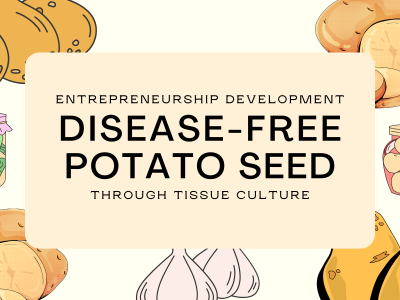Explore our comprehensive catalog of micro-credential courses designed to boost your skills and career. Flexible, industry-aligned, and recognized by employers.

Micro-Credential Course in Good Laboratory Practices (GLP) for Beginners 🧪
Course Code: MC55001
Course Title: Good Laboratory Practices (GLP) for Beginners
Start Date: September 20, 2025 📅
Duration: 12 Hours (Blended: In-person & Online) ⏳
Mode: Blended 🌐
Class Size: Maximum 25 participants 🧑🔬
Course Fee: BDT 1,500 💸
Course Equivalent: 1 Credit Hour
Course Description 🔬
With Bangladesh’s booming agricultural research, agrochemical testing, and food safety sectors, Good Laboratory Practices (GLP) for Beginners (MC55001) meets the urgent need for skilled lab professionals. Reports from the Bangladesh Agricultural Research Council (BARC) and agro-industrial labs highlight a high demand for GLP-trained personnel to ensure quality and safety in research and production. This beginner-friendly course offers foundational knowledge and hands-on skills in lab safety, ethical practices, and equipment handling, preparing you for a career in agriculture and related fields! 🚜
Learning Outcomes ✅
Participants will:
Apply lab safety procedures and handle chemicals responsibly.
Maintain equipment and calibration logs.
Document experiments per GLP standards.
Follow ethical and regulatory lab guidelines.
Target Audience 🎓
Graduate/undergraduate students in agricultural/biological sciences.
Research assistants/lab technicians.
NGO/industry professionals in agriculture/food testing labs.
Entry Requirements 📋
Minimum Diploma/Graduate/Lab professional in science.
Basic knowledge of chemistry/biology preferred.
Career Pathways 💼
Agricultural research labs.
Agrochemical companies.
Food safety/quality control units.
Higher studies in Biochemistry/Agricultural Chemistry.



Join thousands of students already enrolled


Commercial Production of Gerbera Seedlings Through Tissue Culture
Course Code: MC55006
Course Title: Commercial Production of Gerbera Seedlings Through Tissue Culture
Start Date: September 20, 2025 📅
Duration: 26 hours (13 weeks, 2 hours per class) ⏰
Mode: Blended (primarily in-person, occasional online sessions) 🌐
Class Size: 20 participants 👥
Course Equivalent: 2 Credit Hours
Course Fee: 5,000 BDT (3,000 BDT with 40% early registration discount) 💸
Course Description 🚀
Commercial Production of Gerbera Through Tissue Culture (MC55006) addresses the rising demand for high-quality Gerbera plants in the $53.9B global floriculture market, projected to grow at 5.9% CAGR by 2030 (Grand View Research, 2022). In India, a 2021 ICAR-IIHR survey notes 65% of growers seek tissue culture training to enhance production. This course equips learners with practical skills in Gerbera micropropagation, fostering expertise for floriculture careers and agri-entrepreneurship in Bangladesh’s growing biotech sector. 🌟
Syllabus 📚\
Week 1: Intro to Gerbera Tissue Culture – Floriculture overview, benefits. Activities: Market discussion. Resources: ICAR-IIHR reports. 🌸\
Week 2: Gerbera Biology – Morphology, life cycle, varietal selection. Activities: Varietal quiz. Resources: Plant Propagation by Tissue Culture. 📖\
Week 3: Lab Design – Layout, clean zones, infrastructure. Activities: Lab planning. Resources: Laminar airflow, autoclave. 🧪\
Week 4: Equipment & Safety – Autoclave, pH meter, safety protocols. Activities: Equipment demo. Resources: PPE, culture vessels. 🧤\
Week 5: Media Preparation – MS media, growth regulators. Activities: Media formulation lab. Resources: Agar, sucrose. 🧫\
Week 6: Tissue Culture – Explant sterilization, inoculation. Activities: Multiplication lab. Resources: Laminar airflow. 🌱\
Week 7: Incubation – Light, temperature, humidity control. Activities: Growth monitoring. Resources: Incubators. 🌡️\
Week 8: Disease Management – Contaminant detection, control. Activities: Contamination lab. Resources: Diagnostic tools. 🔍\
Week 9: Hardening – Acclimatization, greenhouse setup. Activities: Hardening practice. Resources: Potting mixtures. 🏡\
Week 10: Field Transfer – Transplanting, soil management. Activities: Field visit. Resources: Partner nurseries. 🚜\
Week 11: Entrepreneurship – Nursery setup, cost analysis. Activities: Business plan workshop. Resources: BHTPA schemes. 💼\
Week 12: Market Development – Marketing, export strategies. Activities: Market linkage plan. Resources: Export guidelines. 📈\
Week 13: Project Writing – Nursery proposal presentation. Activities: Proposal submission. Resources: Project templates. 📝
Learning Outcomes ✅
Participants will:
Apply tissue culture techniques for Gerbera propagation. 🌱
Prepare and sterilize media per lab protocols. 🧫
Use and maintain tissue culture equipment. 🛠️
Manage contaminants and disorders in culture. 🔍
Optimize incubation conditions for plantlet growth. 🌡️
Harden and transfer plantlets to field conditions. 🏡
Develop entrepreneurial plans for Gerbera nurseries. 💼
Align with floriculture industry standards. ✅
Target Audience 🎓\
Students in agriculture, horticulture, biotechnology.
Nursery managers, floriculture professionals, agripreneurs.
Entry Requirements 📋\
HSC or equivalent; preferably in biotechnology, agriculture, horticulture.
Basic knowledge of plant biology, microbiology, lab safety.
Minimum age: 19 years.
Career Pathways 🚀\
Tissue culture specialists, nursery managers.
Floriculture entrepreneurs, export consultants.
Roles in ACI, local nurseries, government projects.
MSc/PhD in plant biotechnology, floriculture.
Professional Certificate in Gerbera Tissue Culture.




Join thousands of students already enrolled


Commercial Production of Mushroom Through Tissue Culture - Registration 🍄
Course Code: MC55003
Course Title: Commercial Production of Mushroom Through Tissue Culture
Start Date: September 20, 2025 📅
Duration: 26 hours (13 weeks, 2 hours per class) ⏰
Mode: Blended (primarily in-person, occasional online sessions) 🌐
Class Size: 20 participants 👥
Course Equivalent: 2 Credit Hours
Course Fee: 5,000 BDT (3,000 BDT with 40% early registration discount) 💸
Course Description 🚀
Commercial Production of Mushroom Through Tissue Culture (MC55003) addresses the 25% rise in mushroom demand in Bangladesh (DAE, 2022) and the shortage of skilled technicians in tissue culture, as noted by BARI (2021-22). This course equips learners with hands-on skills in producing high-quality mushroom spawn using tissue culture, supporting year-round cultivation and agri-biotech growth (BHTPA, 2022). Through lab work and fieldwork, participants will master mycelium propagation and commercial production, preparing for careers in mushroom farming, spawn labs, and agripreneurship. 🌟
Syllabus 📚\
Week 1: Intro to Mushroom Cultivation – Industry overview, mushroom benefits. Activities: Market analysis discussion. Resources: DAE reports. 🍄\
Week 2: Mushroom Biology – Life cycle, mycelium development. Activities: Morphology quiz. Resources: Stamets’ The Mushroom Cultivator. 📖\
Week 3: Lab Setup – Tissue culture lab design, equipment. Activities: Lab layout planning. Resources: Laminar airflow, autoclave. 🧪\
Week 4: Sterilization & Safety – Aseptic techniques, PPE. Activities: Sterilization demo. Resources: Safety protocols. 🧤\
Week 5: Media Preparation – PDA, MEA formulation, pH adjustment. Activities: Media prep lab. Resources: Agar, peptone. 🧫\
Week 6: Tissue Culture Techniques – Explant selection, inoculation. Activities: Mycelium culturing. Resources: Incubation chambers. 🌱\
Week 7: Disease Management – Contamination detection, control. Activities: Disease identification lab. Resources: Testing kits. 🔍\
Week 8: Acclimatization – Hardening, substrate adaptation. Activities: Hardening practice. Resources: Substrate samples. 🌿\
Weeks 9-10: Commercial Cultivation – Substrate prep, spawning, harvesting. Activities: Bagging demo. Resources: Straw, sawdust. 🛠️\
Week 11: Entrepreneurship – Costing, market linkages, export. Activities: Business plan workshop. Resources: BHTPA reports. 💼\
Week 12: Field Visit – Commercial farm tour. Activities: On-site observation. Resources: Partner farms. 🚜\
Week 13: Project Writing – IYCF program proposal. Activities: Proposal presentation. Resources: Project templates. 📝
Learning Outcomes ✅
Participants will:
Explain mushroom morphology and life cycle. 📚
Design and maintain a tissue culture lab. 🧪
Operate lab equipment for spawn production. 🛠️
Prepare and optimize culture media. 🧫
Apply aseptic techniques for mycelium propagation. 🌱
Control incubation conditions (light, temperature, humidity). 🌡️
Detect and manage contamination/diseases. 🔍
Acclimatize mycelium for substrate cultivation. 🌿
Plan commercial mushroom production. 🏭
Develop entrepreneurial skills for mushroom ventures. 💼
Apply standards for local/export markets. ✅
Target Audience 🎓\
Biotechnology, microbiology, agriculture students.
Mushroom farmers, agripreneurs, lab technicians.
Agri-biotech/food processing professionals.
Entry Requirements 📋\
HSC or equivalent; preferably in biotechnology, agriculture, or related fields.
Basic knowledge of plant/fungal biology and lab safety.
Minimum age: 19 years.
Career Pathways 🚀\
Mushroom production specialists, spawn lab managers.
Agri-biotech entrepreneurs, extension workers.
Roles in ACI Agribusiness, government projects.
MSc/PhD in mycology, agricultural biotechnology.
Professional Certificate in Mushroom Tissue Culture.




Join thousands of students already enrolled


Entrepreneurship Development of Disease-Free Potato Seed Through Tissue Culture
Course Code: MC55004
Course Title: Entrepreneurship Development of Disease-Free Potato Seed Through Tissue Culture
Start Date: September 20, 2025 📅
Duration: 26 hours (13 weeks, 2 hours per class) ⏰
Mode: Blended (primarily in-person, occasional online sessions) 🌐
Class Size: 20 participants 👥
Course Equivalent: 2 Credit Hours
Course Fee: 5,000 BDT (3,000 BDT with 40% early registration discount) 💸
Course Description 🚀
Entrepreneurship Development of Disease-Free Potato Seed Through Tissue Culture (MC55004) addresses the critical need for disease-free potato seeds in Bangladesh, where 60% of farmers face yield losses due to seed-borne diseases (BARI, 2022). This course equips learners with practical tissue culture skills to produce high-quality potato seeds, meeting the 70% shortage of trained technicians reported by the Bangladesh Tissue Culture Association (2023). Through lab work, fieldwork, and entrepreneurial training, participants will drive agricultural innovation and agribusiness opportunities. 🌟
Syllabus 📚\
Week 1: Intro to Potato Seed Production – Potato’s role, tissue culture benefits. Activities: Market analysis. Resources: BARI reports. 🥔\
Week 2: Potato Biology – Morphology, life cycle, healthy explants. Activities: Plant identification quiz. Resources: Plant Propagation by Tissue Culture. 📖\
Week 3: Lab Design – Lab zones, workflow. Activities: Layout planning. Resources: Laminar airflow, autoclave. 🧪\
Week 4: Equipment Use – Autoclave, pH meter, microscope. Activities: Equipment demo. Resources: Culture vessels. 🛠️\
Week 5: Chemical Safety – Handling agar, MS salts. Activities: Safety protocol practice. Resources: PPE, chemicals. 🧤\
Week 6: Sterilization – Autoclaving, explant sterilization. Activities: Sterilization lab. Resources: Sodium hypochlorite. 🧫\
Week 7: Media Preparation – MS media, growth regulators. Activities: Media formulation. Resources: Sucrose, agar. 🌱\
Week 8: Tissue Culture – Explant inoculation, subculturing. Activities: Shoot regeneration lab. Resources: Laminar airflow. 🌿\
Week 9: Incubation – Light, temperature, humidity control. Activities: Growth monitoring. Resources: Incubators. 🌡️\
Week 10: Disease Management – Pathogen detection, quality assurance. Activities: Contamination lab. Resources: Testing kits. 🔍\
Week 11: Hardening – Acclimatization, polyhouse use. Activities: Hardening practice. Resources: Greenhouse materials. 🏡\
Week 12: Field Transfer – Planting, post-care. Activities: Field visit. Resources: Partner farms. 🚜\
Week 13: Entrepreneurship – Business planning, market linkages. Activities: Proposal presentation. Resources: DAE funding schemes. 💼
Learning Outcomes ✅
Participants will:
Apply tissue culture principles for potato seed production. 🌱
Prepare media and use aseptic techniques per lab standards. 🧫
Operate and maintain tissue culture equipment. 🛠️
Manage contamination and ensure quality control. 🔍
Optimize incubation conditions for plantlet growth. 🌡️
Diagnose potato pathogens using standard methods. 🦠
Harden and transfer plantlets to field conditions. 🏡
Develop entrepreneurial plans for seed production. 💼
Align with local/international seed standards. ✅
Establish or contribute to tissue culture labs. 🏭
Target Audience 🎓\
Final-year diploma/undergraduate students in agriculture, biotechnology.
Early-career professionals, lab technicians, agripreneurs.
Entry Requirements 📋\
HSC or equivalent; preferably in biotechnology, agriculture.
Basic knowledge of plant biology, microbiology, lab safety.
Minimum age: 19 years.
Career Pathways 🚀\
Agri-biotech entrepreneurs, seed enterprise managers.
Roles in ACI, BADC, government projects.
MSc/PhD in plant biotechnology, seed science.
Professional Certificate in Potato Tissue Culture.
Research assistants, lab technologists in seed production.




Join thousands of students already enrolled


Commercial Production of Disease-Free Banana Seedlings Through Tissue Culture
Course Code: MC55005
Course Title: Commercial Production of Disease-Free Banana Seedlings Through Tissue Culture
Start Date: September 20, 2025 📅
Duration: 26 hours (13 weeks, 2 hours per class) ⏰
Mode: Blended (primarily in-person, occasional online sessions) 🌐
Class Size: 20 participants 👥
Course Equivalent: 2 Credit Hours
Course Fee: 5,000 BDT (3,000 BDT with 40% early registration discount) 💸
Course Description 🚀
Commercial Production of Banana Through Tissue Culture (MC55005) addresses the critical need for disease-free, high-yielding banana planting materials in Bangladesh, where bananas account for 40% of fruit production but face yield losses from diseases (BBS, 2022). With tissue culture boosting yields by 30–50% (BARI, 2022), this course equips learners with practical skills to produce quality banana plantlets, meeting the demand for skilled technicians noted by BHTPA (2022). Through lab work, fieldwork, and entrepreneurial training, participants will drive agri-biotech innovation and agribusiness growth. 🌟
Syllabus 📚\
Week 1: Intro to Banana Tissue Culture – Industry overview, benefits. Activities: Market discussion. Resources: BARI reports. 🍌\
Week 2: Banana Biology – Morphology, life cycle, cultivars. Activities: Cultivar identification quiz. Resources: Plant Propagation by Tissue Culture. 📖\
Week 3: Lab Setup – Design, clean zones, equipment. Activities: Lab planning. Resources: Laminar airflow, autoclave. 🧪\
Week 4: Equipment & Safety – Autoclave, pH meter, safety protocols. Activities: Equipment demo. Resources: PPE, culture vessels. 🧤\
Week 5: Media Preparation – MS media, growth regulators. Activities: Media formulation lab. Resources: Agar, sucrose. 🧫\
Week 6: Tissue Culture – Explant sterilization, inoculation. Activities: Shoot multiplication lab. Resources: Laminar airflow. 🌱\
Week 7: Incubation – Light, temperature, humidity control. Activities: Growth monitoring. Resources: Incubators. 🌡️\
Week 8: Disease Management – Pathogen detection, control. Activities: Contamination lab. Resources: Diagnostic tools. 🔍\
Week 9: Hardening – Acclimatization, shade house setup. Activities: Hardening practice. Resources: Potting mixtures. 🏡\
Week 10: Field Transfer – Planting, irrigation, pest management. Activities: Field visit. Resources: Partner farms. 🚜\
Week 11: Entrepreneurship – Nursery setup, cost analysis. Activities: Business plan workshop. Resources: BHTPA schemes. 💼\
Week 12: Market Development – Marketing, export strategies. Activities: Market linkage plan. Resources: Export guidelines. 📈\
Week 13: Project Writing – Nursery proposal presentation. Activities: Proposal submission. Resources: Project templates. 📝
Entry Requirements 📋\
HSC or equivalent; preferably in biotechnology, agriculture, horticulture.
Basic knowledge of plant biology, microbiology, lab safety.
Minimum age: 19 years.
Career Pathways 🚀\
Tissue culture technicians, nursery managers.
Agri-biotech entrepreneurs, extension officers.
Roles in ACI, Lal Teer, BADC projects.
MSc/PhD in plant biotechnology, horticulture.
Professional Certificate in Banana Tissue Culture.




Join thousands of students already enrolled


Commercial Production of Orchids Through Tissue Culture
Course Code: MC55007
Course Title: Commercial Production of Orchids Through Tissue Culture
Start Date: September 20, 2025 📅
Duration: 26 hours (13 weeks, 2 hours/week) ⏰
Mode: Primarily in-person, with occasional online sessions 🌐
Class Size: 10-30 participants 👥
Course Equivalent: 2 Credit Hours
Course Fee: 5,000 BDT (Special Offer: 3,000 BDT with 40% discount) 💸
Course Description 🚀
Commercial Production of Orchids Through Tissue Culture (MC55007) addresses the surging demand for high-quality orchids in Bangladesh, with a 30% market increase reported by the Bangladesh Florist Association (2022). This course equips learners with hands-on skills in orchid micropropagation using tissue culture, focusing on standardized protocols to meet commercial standards. Through practical training and entrepreneurial guidance, participants will be prepared for careers in floriculture, biotechnology, or agri-entrepreneurship, contributing to Bangladesh’s growing $50M floriculture industry (BARI, 2021). 🌺
Syllabus 📚
Week 1: Introduction to Orchids & Tissue Culture – Orchid significance, tissue culture overview. Activities: Analyze market trends. Resources: Reference books. 🌸
Week 2: Orchid Biology – Morphology, life cycle, explant sources. Activities: Identify orchid parts. Resources: Microscope, slides. 🌱
Week 3: Lab Setup – Lab zoning, equipment overview. Activities: Tour lab setup. Resources: Laminar airflow cabinet, autoclave. 🧪
Week 4: Media Preparation – Growth regulators, nutrients, pH adjustment. Activities: Prepare MS media. Resources: pH meter, chemicals. 🧫
Week 5: Sterilization Techniques – Autoclaving, chemical sterilization. Activities: Sterilize explants. Resources: Bleach, ethanol. 🧴
Week 6: Tissue Culture Process – Explant initiation, shoot multiplication. Activities: Initiate culture. Resources: Incubator. 🌿
Week 7: Culture Maintenance – Contamination control, hardening. Activities: Monitor cultures. Resources: Humidity chambers. 🛡️
Week 8: Hardening & Acclimatization – Plantlet transfer, nutrient management. Activities: Practice hardening. Resources: Substrates. 🌱
Week 9: Field Transfer – Substrates, post-transfer care. Activities: Transfer plantlets. Resources: Greenhouse materials. 🌍
Week 10: Entrepreneurship – Market analysis, costing, branding. Activities: Draft business plan. Resources: Case studies. 💼
Week 11: Project Writing – Develop entrepreneurial project proposal. Activities: Write project plan. Resources: Templates. 📝
Week 12: Field Visit – Observe commercial orchid production. Activities: Visit nursery. Resources: Transport. 🚐
Week 13: Revision & Assessment – Review, final project submission. Activities: Present project. Resources: Evaluation rubrics. 🎯
Entry Requirements 📋
Higher Secondary Certificate (HSC) or equivalent.
Background in Biotechnology, Microbiology, Agriculture, or related fields.
Basic understanding of plant biology, microbiology, and lab safety.
Minimum age: 19 years.
Career Pathways 🚀
Tissue culture specialist, orchid nursery manager, floriculture consultant.
Agri-entrepreneur in orchid production or export businesses.
Higher studies in Plant Biotechnology, Horticulture, or Agricultural Sciences.
Professional Certificate in Orchid Tissue Culture.



Join thousands of students already enrolled
Try adjusting your filters to see more courses.
